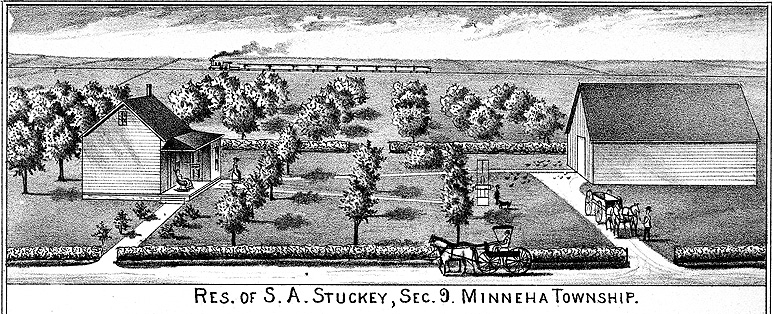
Sedgwick County KSGenWeb

Portrait And Biographical Album of Sedgwick County, Kan.
Chapman Brothers 1888
Pages 903 - 904
SAMUEL A. STUCKEY, a native of Berkeley County, Va., where he was born Jan. 19, 1843, left the Old Dominion for Logan County, Ill., in 1874, and from there two years later came to Kansas, and purchased 200 acres of land on sections 9 and 16, in Minneha Township. Here since that time he has operated successfully as a farmer and stock-grower, having one of the most desirable homesteads in this section, and an assortment of live stock which will compare favorably with anything of the kind in the township. He came at a time when the reliable and enterprising man was most needed, and has furnished his full quota of assistance in building up the eastern part of this county.
Mr. Stuckey received a common-school education, and remained at his father's farm until the outbreak of the late Rebellion, when he enlisted for three years or during the war, in Company E, 2d Virginia Infantry. He was in many general engagements, including the battle at Winchester, where he was wounded in the neck, and the first battle of Fredericksburg, where he was wounded in the breast. At home he was captured by the Union troops, and confined a prisoner at Camp Chase, Ohio, for eight months. He was on parol at the closing of the war, and after being mustered out of service returned to his old home in the South, and on the 7th of November, 1875, was married to Miss Fanny Larkins, who was born in Shenandoah County, Va., April 17, 1847. Her parents, Andrew and Rebecca Larkins, were natives of Maryland and Virginia. The former is dead, and the latter now resides in Ohio.
Mr. Stuckey was accompanied by his family in his removals, first to Illinois, and subsequently to this State. He is the father of five children: Annie, Mrs. Stover, of Wichita; Robert, Mary S., Charles and Edna B. The latter was the youngest born, and died when two months old. Mr. Stuckey, politically, votes the straight Democratic ticket, but has very little to do with public affairs, confining his attention mostly to farming interests.
Among the numerous views given in this ALBUM as representative buildings, both of city and farm property, may be found one of Mr. Stuckey's place,
[ Home ]
![]()